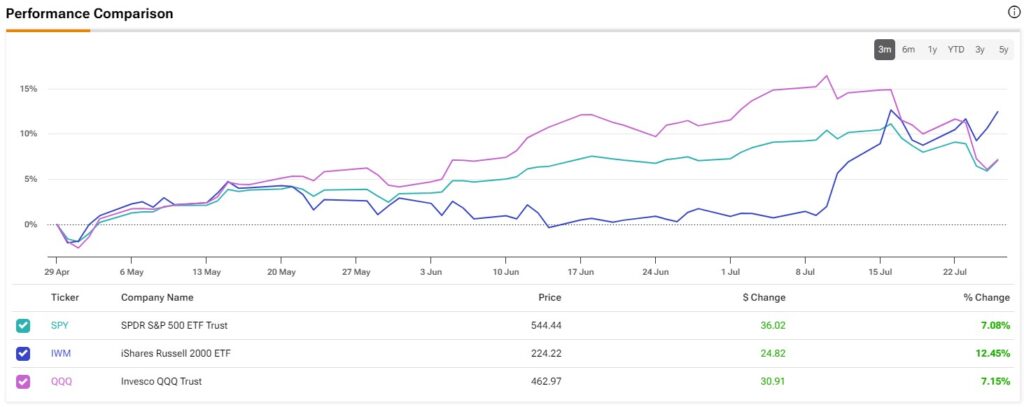The Russell 2000 index’s ongoing strong performance is a spectacular feat; if the major market indexes were Olympic competitors, all eyes would be on small-caps closing the gap at full speed to catch the tiring large-cap stocks that had seemed unbeatable. For investors in the sector, every inch of overperformance from here is a win.
Elevate Your Investing Strategy:
- Take advantage of TipRanks Premium at 50% off! Unlock powerful investing tools, advanced data, and expert analyst insights to help you invest with confidence.
The Index Competition
It has been a stunning turn of events for the Russell 2000 index, representing small-cap stocks. It has been on a winning streak, outpacing its large-cap counterparts for a while now. In July alone, the index surged by over 9%, leaving the S&P 500 in the dust. This impressive performance can be attributed to a more favorable interest rate outlook and easing inflation. These are among the factors which have boosted investor confidence in small-cap stocks.
There seems to be a lot of value in smaller stocks that were ignored while large and mega-caps stole the show. Nicholas Galluccio, portfolio manager at Teton Westwood, observed, “This breakout only tells me that finally you’re gonna get some rational investors back in the markets.”
Historical Performance and Future Outlook
Small-cap stocks have a history of outperforming large-cap stocks, as demonstrated by the Fama French 3-factor model; the well-known model demonstrates that since 1927, small caps have outperformed large caps by an average of two percentage points annually. However, the past decade has been uglier for small caps, with the “Magnificent Seven” tech stocks dominating the spotlight.
Mike Rode of American Century Investments noted, “It’s been a tough run for small caps. You’ve seen the ‘Magnificent Seven’ kind of suck up all the air out of the room.” Despite this, Rode and Galluccio anticipate a cyclical outperformance for small caps over the next 12 to 24 months, with Galluccio even predicting that this trend could last up to three years.

Using the TipRanks ETF Comparison Tool, we see above that the three-month performance of the iShares Russell 2000 ETF (IWM) has outshone both the SPDR S&P 500 ETF (SPY) and the Nasdaq 100, represented here by the Ivesco QQQ Trust (QQQ) by gaining more than an additional 5% in ground over each indexed ETF. The index is still underperforming this year but has several factors working in its favor.
Onshoring and M&A Activity Fuels Small-Cap Momentum
The onshoring of supply chains amid rising geopolitical tensions has contributed to the small-cap rally. Within the sector, individual companies involved in domestic projects, such as construction and regional banking, are projected to benefit from this trend. For example, constructing an electric vehicle battery plant for Panasonic (PCRFF) in De Soto, Kansas, is anticipated to boost small-cap companies involved in building and financing these projects.
Another example is Summit Materials (SUM), a construction materials company, which is a beneficiary, with analysts poll made by LSEG rating it a buy. Similarly, Cohu (COHU), a wafer-handling company, is seen as a promising investment due to its strong balance sheet and earnings potential, despite its shares being down 10% this year.
The Small-Cap Advantage: A Winning Strategy?
As the Russell 2000 continues to outperform its large-cap counterparts, investors may wonder if small-cap stocks are the new champions in the stock market Olympics. While it’s common to hear the phrase, “past results don’t indicate future returns,” over the long haul, performance spreads between small and large caps have been 2% in favor of small caps, yet this has been out of kilter since the pandemic.
Over the past three years, the QQQ and SPY have returned more than five times the return. The recent performance of small-cap stocks, combined with favorable economic and geopolitical factors, suggests they may now have a competitive edge.
The Race Continues
The Russell 2000’s recent surge toward the top step of the stock market podium is a testament to the resilience and potential of growth companies, especially small-cap stocks. As the market evolves, it will be fascinating to see if small-caps can maintain their lead and secure a lasting victory.
















